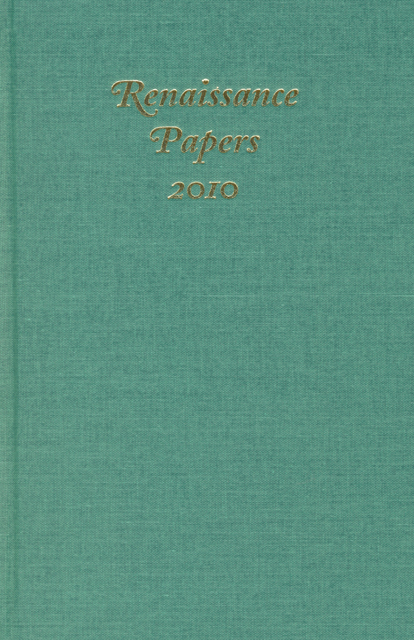Book contents
- Frontmatter
- Contents
- Renaissance Papers
- Aretino’s Life and His Afterlife in England
- Mixing Genres in George Peele’s David and Bethsabe
- Royal Prerogative versus the Common Law in A View of the Present State of Ireland and The Faerie Queene, Book 5
- The Limits of Clowning in the Age of Marprelate: The Anti-Martinist Tracts and 2 Henry VI
- Shakespeare’s Iago
- Francesco Patrizi da Cherso, Caravaggio, and the Metaphysics of Light
- Being John Donne in 1602
- The Problem of the Human in Sir Francis Bacon
- The Glamorous Echoes of Godly Print
- “More cullors than the Rainbowe caries”: Catholics, Cosmetics, and the Aesthetic Economy of Protestant England
Aretino’s Life and His Afterlife in England
Published online by Cambridge University Press: 10 February 2023
- Frontmatter
- Contents
- Renaissance Papers
- Aretino’s Life and His Afterlife in England
- Mixing Genres in George Peele’s David and Bethsabe
- Royal Prerogative versus the Common Law in A View of the Present State of Ireland and The Faerie Queene, Book 5
- The Limits of Clowning in the Age of Marprelate: The Anti-Martinist Tracts and 2 Henry VI
- Shakespeare’s Iago
- Francesco Patrizi da Cherso, Caravaggio, and the Metaphysics of Light
- Being John Donne in 1602
- The Problem of the Human in Sir Francis Bacon
- The Glamorous Echoes of Godly Print
- “More cullors than the Rainbowe caries”: Catholics, Cosmetics, and the Aesthetic Economy of Protestant England
Summary
Pietro Aretino lived from 1492 to 1556. In English-speaking lands, he is far better known for his tarnished reputation as a pornographer than he is by actual readers. This fame (or rather infamy) is based mainly on a few lascivious sonnets he wrote as a youth (about which, more later). He was also rather well known for three slim volumes of raw satire known collectively as Il ragionamenti. This work purportedly records the conversations of a couple of middle-aged women who talk frankly about the career opportunities open to females. A talented trollop tells her bosom buddy that society has but three roles for a woman: she must be either a nun, a wife, or a whore; and she proceeds to describe her own experiences in all three roles in graphic detail. Her life in a convent was a never-ending orgy of food, drink, and sex (indeed, the hypocrisy of life in the nunnery left her so disillusioned that she left after a few days). She regales us with stories of wives who easily deceive the most vigilant husbands and she concludes her narrative with explicit accounts of the pleasant life enjoyed by courtesans. These dialogues were not only a great commercial success but they also garnered considerable critical acclaim at home and abroad.
In Italy in the second quarter of the sixteenth century, however, Aretino’s fame was more firmly based on his unfinished epic Marf isa, which takes up where Ariosto’s Orlando Furioso leaves off, and on his devotional works, which include The Seven Psalms of David (on which Sir Thomas Wyatt based his Lutheran-leaning Penitential Psalms), The Three Books of the Humanity of Christ, The Story of Genesis, The Life of St. Catherine of Alexandria, and The Life of the Virgin Mary (and for these he was called “the divine Aretino”). He was also admired for four witty comedies and a tragedy, Orazia, that is perhaps the best Italian tragedy of the sixteenth century; and for his carefully edited collections of over 3,000 letters to rich and powerful friends, enemies, and acquaintances. An eyewitness recounts what happened when a new volume of Aretino’s letters first went on sale in Rome:
I never saw such a press of … men striving to be the first to purchase your new book.
- Type
- Chapter
- Information
- Renaissance Papers 2010 , pp. 1 - 10Publisher: Boydell & BrewerPrint publication year: 2011
- 1
- Cited by

